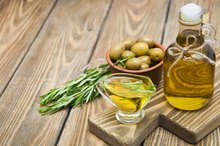How to Clean Baby Bottles That Have a Milk Odor
Baby bottles make it convenient for you, a loved one or a babysitter to feed your baby expressed breast milk or formula. However, it’s essential to keep bottles clean so they don’t introduce bacteria into your baby’s system, explains KidsHealth. A proper cleansing and sanitizing system can also help remove lingering odors formed by milk left inside the bottles that might make you nauseated or change your baby’s willingness to take future meals from the container.
Pour out any leftover milk that might be causing the baby bottle. Rinse the bottle and nipple with water.
How to Clean Bottle Nipples
Learn More
Scrape any milk residue from the sides of the bottle with a bottle brush. Use the brush to scrub the inside of the bottle and nipple, which may also have a milk odor, suggests the California Pacific Medical Center 1.
Wash the bottle with dish washing soap and hot water. You can wash plastic or glass baby bottles in the top rack of the dishwasher for a thorough cleaning, notes KidsHealth. In addition to removing milk odor, a proper cleaning can prevent the formation of bacteria inside the containers.
How to Test If Milk Is Spoiled
Learn More
Deodorize the bottle if it has lingering odors from the milk. Pour 1 tsp. baking soda into the bottle and fill it with warm or hot water. Shake the container to help the baking soda solution cleanse the inside of the bottle before rinsing it out.
Remove stubborn milk odors from bottles by soaking the containers overnight. You can create a deodorizing liquid in a large plastic tub, metal baking pan or glass casserole dish or bowl. Add 4 tbsp. baking soda and 1 quart of hot or warm water. Let the bottles and nipples soak in the solution, and then wash the containers completely with dish washing soap and hot water. Allow them to air dry completely before using them.
Tips
Reduce the odors that the baby bottles emit by buying a type of nipple that doesn’t already have a strong scent of its own. Silicone nipples not only give your baby more control of the bottle’s milk flow, but also have fewer odors than nipples created of other materials, such as latex or rubber, advises the California Pacific Medical Center.
Warnings
Avoid leaving milk inside the baby bottles that can cause odors to form. Refrigerate filled bottles to reduce the risk of bacteria formation and discard mixed formula from bottles after 24 hours of refrigeration or tossing ready-to-eat formula after 48 hours. If formula has been sitting at room temperature, throw it away after one hour. Discard expressed breast milk after eight hours at room temperature or eight days in the refrigerator.
Related Articles
References
Tips
- Reduce the odors that the baby bottles emit by buying a type of nipple that doesn’t already have a strong scent of its own. Silicone nipples not only give your baby more control of the bottle’s milk flow, but also have fewer odors than nipples created of other materials, such as latex or rubber, advises the California Pacific Medical Center.
Warnings
- Avoid leaving milk inside the baby bottles that can cause odors to form. Refrigerate filled bottles to reduce the risk of bacteria formation and discard mixed formula from bottles after 24 hours of refrigeration or tossing ready-to-eat formula after 48 hours. If formula has been sitting at room temperature, throw it away after one hour. Discard expressed breast milk after eight hours at room temperature or eight days in the refrigerator.
Writer Bio
Drea Christopher is a freelance writer with a bachelor's degree in English. She has more than 10 years of experience producing features and SEO articles for national consumer publications, trade magazines and industry leading Web content providers. She has a particular interest in craft, entertaining, education, home and garden and health-related topics.









